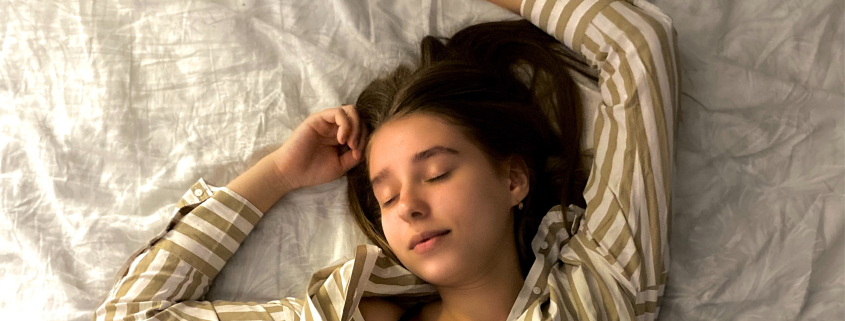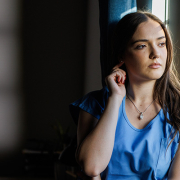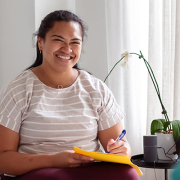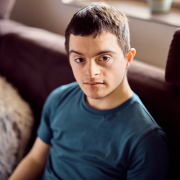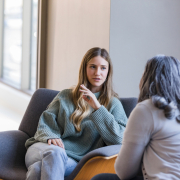Sleep hygiene: how to make the most of your shut-eye
What is sleep hygiene?
Sleep hygiene is exactly as it sounds. It’s all about making sure you’re following good sleeping habits. It’s no different to your personal hygiene, or even your diet.
How well we sleep can have profound effects on our mental health and wellbeing, and vice versa – how we are feeling physically and emotionally plays a big role in how well we sleep.
That’s why good sleep habits and finding ways to improve sleep hygiene is so important. A healthy mind and body needs (some would say craves) a good night’s sleep.
What happens when your head hits the pillow can impact how well you live your life. We all know what a bad night’s sleep feels like. We’re tired, demotivated, irritable, and lose focus easily.
What’s more, if you suffer from any mental health issue or concern, bad sleep can make an already difficult situation or period in your life worse.
Causes of bad sleep hygiene
Even if you manage to get to bed at a decent time, avoiding the trappings of your mobile phone or laptop, you might still find your sleep quality lacking.
There are plenty of reasons why you might be feeling far from functional the next morning, some of which are more obvious than others. Let’s explore them.
Anxiety
Anxiety is often connected to poor sleep. Feeling anxious and worried can make your mind race and make it more difficult to get to sleep.
This can work in a cycle, with poor sleep making your anxiety worse. If your mind is keeping you awake, or you can’t stay asleep, you might have a sleep disorder or anxiety disorder.
Click here to learn more about anxiety.
Depression
If you’re depressed, you may find it difficult to fall asleep and to stay asleep, especially if you’ve slept too much throughout the day.
Like anxiety, poor sleep can make your depression worse, which can create a vicious cycle that can be difficult to break.
Click here to learn more about the different types of depression.
Eating and drinking late:
Eating or drinking too close to bedtime should be avoided. It can make it difficult for you to fall asleep and then stay asleep.
Leaving three hours between eating and going to bed should give your body enough time to digest your food, whilst helping the effects of things like caffeine wear off.
Jet lag:
If you’ve recently returned from abroad, the change in time zones can throw your body clock off and leave you feeling tired or awake at odd times of the day or night.
Relationship issues:
The same way anxiety can stop you falling asleep, relationship issues can play on your mind and make it more difficult for you to get to sleep.
That’s not to say relationship issues are the only issues that can stop you from getting good quality sleep, but it is one of the most common reasons.
Shift work:
If you work in a job where your shift patterns frequently change, you may find yourself struggling to get to sleep or fall into a regular routine.
Similar to jet lag, your body’s internal clock will find it difficult sustaining any kind of consistency, which can leave you feeling tired and irritated.
Stress:
Stress can impact the quality and duration of your sleep and, like anxiety and depression, not getting enough sleep may also lead to stress.
People suffering from stress often find themselves struggling to get to sleep, with their worries and concerns playing on their mind.
Insomnia:
Insomnia is a common sleep disorder that can make it difficult for you to fall asleep, or stay asleep, once you dose off.
The disorder can leave you feeling low on energy and in a bad mood, whilst your physical health and day-to-day life can be significantly impacted.
How to develop good sleep hygiene: sleep hygiene techniques you need to start using
There are a number of measures you can take to improve sleep hygiene, from adopting healthier habits to listening to your body. Let’s explore some of these now.
Watch your body clock
- Make sure you get up when you wake up – preferably at the same time, even on weekends
- When you’re tired, go to bed or start preparing for sleep, don’t ignore it
- Avoid afternoon naps
Follow a routine:
- Spend 30 minutes properly winding down from your day
- If you’re a worrier, try adding an extra half an hour of ‘worry time’
- Get rid of any distractions like televisions, mobile phones and laptops
- Try relaxation exercises like yoga or meditation to see if they work for you
Healthy habits:
- Cut down on alcohol and smoking
- Be active and exercise regularly
- Enjoy fresh air – a gentle walk, sitting in a local park or staring at the horizon from the beach
- Don’t eat near bedtime
In The Bedroom:
- Make sure you have a comfortable pillow, sheets and mattress
- Set a comfortable temperature – if you can’t, invest in your bedding
- Block out light and try make your bedroom as dark as possible – try an eye mask if you need
- Use earplugs if you can’t drown out noise
Things to avoid:
We’ve already looked at some of the main causes of bad sleep hygiene, and some of the proactive steps you can take to maximise your sleep and improve sleep hygiene.
Now we’ll take a look at three of the things you should avoid – or cut back on – to give yourself the best chance of feeling refreshed in the morning.
Cigarettes:
We all know that smoking is bad, but did you know that it can also have a huge impact on the amount of sleep you’re getting?
Nicotine has stimulant properties which can rouse your brain, increase your heartbeat and increase your blood pressure: all things to avoid if you’re after a good night’s sleep.
Alcohol
Some people claim alcohol helps them fall asleep, but it can also disturb your sleep pattern and leave you feeling tired long after you’ve woken up.
Research has also shown that sleepers who drink later amounts of alcohol before going to bed are often prone to delayed sleep onset – dispelling the notion that alcohol is a sleeping aid.
Caffeine
Coffee and other drinks with high sugar content or caffeine can give you a burst of energy, making you feel alert and increasing your heartrate.
Avoiding caffeine before bed is a good idea – with some organisations suggesting avoiding drinks like coffee six hours before your head touches the pillow.
Where to from here?
We all visit our dentist when we have a toothache. The same goes for our physical health and why we schedule appointments with our GP, gynaecologist, physio, chiro, dermatologist, naturopath… the list is endless.
So why treat our mental health and wellbeing any differently? If you want to improve sleep hygiene, or you’ve been stressed or worried for a long time, then let’s talk about it.
Access Psych is here to support you. Call us on 1800 277 924 or email info@accesspsych.com.au to start a conversation.
Resources that can help improve sleep hygiene
Head to Health
Head to Health is a resource produced by the Australian Government Department of Health that brings together apps, online programs, online forums and phone services, along with a range of digital information resources.
They also have a fantastic page dedicated to sleep, with links to handy sleep apps and tonnes of useful information. For more, visit: headtohealth.gov.au
Sleep Health Foundation
Sleep Health Foundation is a not-for-profit health promotion charity that aims to raise community awareness about the importance of sleep and common sleep disorders.
The site is filled with fact sheets, key events and other handy resources. For more, visit: sleephealthfoundation.org.au
For urgent support
If there’s an immediate risk of harm to yourself or others, please call 000.
If you need someone to talk with now, call:
- Lifeline: 13 11 14
- Beyond Blue: 1300 22 4636 or chat online at beyondblue.org.au
- Suicide Call Back Service: 1300 659 467
The information provided in this document is general in nature and is intended to be used for information purposes only. While we have tried to ensure the accuracy of the information published, no guarantee can be given that the information is free from error or omission or that it is accurate, current or complete.
The information published is not, and should not be relied on as, health or treatment advice. The diagnosis and treatment of any mental illness requires the attention of a physician or other properly qualified mental health professional. If you are seeking diagnosis or treatment of any other mental illness, you should consult a physician or mental health professional. You should not delay in seeking, or disregard, professional health advice because of something you have read in this document.

